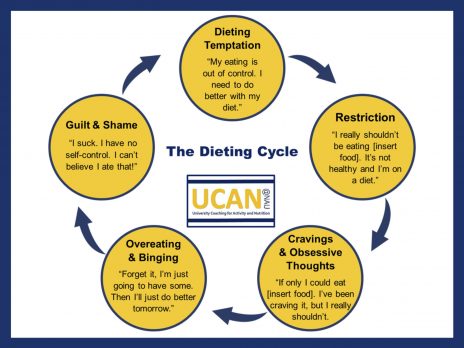An invitation to shrink inches, slim down, or bulk up is around every corner. Diet culture, you sneaky devil. You stare us in the face every direction we turn – TV, movies, magazines, social media, billboards, even our friends and family.
Everyone is hungry for the “miracle” product that will melt the fat away. Like literally hungry. Most weight loss plans involve restricting certain foods, calorie counting, or just ignoring hunger, or trying to trick the brain into believing it’s not starving.
The truth is that most of the time, pursuing weight loss doesn’t actually work in the long run, and weight loss doesn’t always result in a person becoming healthier.
Take a moment to read some of the reasons why diets don’t work and why they can have negative consequences. Next week we’ll cover what you can do instead.
Reason #1: Dieting can lead to disordered eating patterns or a bad relationship with food.
Restricting and counting things like macros and calories can lead to obsessive and disordered behaviors such as skipping meals, ignoring hunger cues, extreme exercise, and worry and concern overeating. Many diets teach deprivation rather than nourishment.
Plus, most dieters are obsessed with the number on the scale, allowing that number to dictate their mood that day, what they eat, and sometimes even their value in the world.
It’s easy to become constantly dissatisfied with your body, obsessed with the number on the scale, and worried about eating the “right” food. Overall, diets can reshape and damage your relationship with food and eating.
Reason #2: Dieting is associated with weight gain, not weight loss.
The irony, amiright? But it’s true! The pursuit of weight loss is actually associated with weight gain! There’s typically weight loss at first, but then almost every dieter ends up gaining the weight back that they lose.
Even those who maintain the changes for a few years will regain weight within 5 years because the body is designed to resist starvation and therefore will push back against any efforts to change weight using a cascade of hormones and neurotransmitters.
Basically, restrictive eating slows down metabolism to try to preserve body weight. Plus, depriving yourself of food can lead to a binge-eating cycle, where you’re trying to “be good” one second and then stuffing your face the next second.
I won’t bore you with all the science, but suffice it to say, our body won’t go down without a fight if it thinks it’s being starved.
Reason #3: People trying to lose weight will get stuck in the “dieting cycle”.
 The dieting cycle shows the negative effects of dieting that can lead to harmful behaviors.
The dieting cycle shows the negative effects of dieting that can lead to harmful behaviors.
- The cycle starts with the temptation to diet. You might have thoughts such as “my eating patterns are out of control,” or “I need to do better with my diet.”
- This leads to restriction where you might have thoughts along the lines of “I shouldn’t be eating this food, food group, or macronutrient,” or “This food is not healthy and I am on a diet.”
- These thought patterns may lead to obsessive thoughts and cravings. You might find yourself thinking “I wish I could eat this certain food,” or “I’ve really been craving this food but I should not be eating it.”
- This leads to binging and overeating. You might think “I’m just going to eat this food and eat as much as I want of it. I will do better tomorrow”.
- The binging and overeating can lead to guilt and shame. You might find yourself having thoughts of “I have no control.” or “I can’t believe I ate that.” or “I’m a bad person.”
- From here the cycle continues and spirals.
Reason #4: Diets only focus on food, not overall health.
There are so many aspects of health, and what you eat is just one of them. Living a healthy lifestyle has to do with a lot more than diet alone. There are actually 7 other dimensions of wellness aside from the physical aspect. These include emotional, social, intellectual, occupational, environmental, spiritual, and financial health. Check out the link to further explore these topics.
Reason #5: Diets aren’t one-size-fits-all.
Everyone’s body is very different and therefore, everyone’s needs vary. Underlying conditions, weight, height, personal lifestyle goals, genetics, and allergies can all affect what the body needs.
For example, a person with diabetes could be seriously harmed by the ketogenic diet, as it cuts out a majority of carbs. People with diabetes need carbs to stabilize their blood sugar.
Or, consider the fact that often foods recommended for certain diets are really expensive and they just may not be affordable for some people.
In sum, diets suck. Pursuing weight loss isn’t the answer. The answer is to find sustainable and enjoyable patterns that fit your lifestyle. Let go of the scale and embrace the body you’re in. More details to come in next week’s blog!